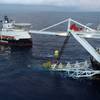A unanimous Supreme Court ruled the state of Washington overstepped its authority in attempting to regulate the operation of tank vessels in state waters. The Court's 9-0 decision in the closely watched case (Intertanko v. Locke, United States v. Locke) reversed the June 1998 decision of the Ninth Circuit Court of Appeals upholding most of the state's "Best Achievable Protection" (BAP) standards for tank vessels. The Court found sufficient evidence to declare four of the Washington regulations unconstitutional and remanded the case so the validity of the others may be assessed by a lower court "in light of the considerable federal interest at stake and in conformity with the principles" set forth in the Supreme Court decision.
Writing for the unanimous Court, Justice Anthony Kennedy noted "The State of Washington has enacted legislation in an area where the federal interest has been manifest since the beginning of our Republic and is now well established."
The Court reaffirmed the continuing validity of the reasoning behind the landmark Ray v. Atlantic Richfield Co. decision, which recognizes the authority of states to regulate some matters of particular local concern, but reserves to the federal government the regulation of tank vessel "design, construction, alteration, repair, maintenance, operation, equipping, personnel qualification, and manning."
"We reaffirm Ray's holding on this point," the unanimous Court concluded. "Congress has left no room for state regulation of these matters."
While the Ninth Circuit held OPA 90 significantly narrowed the field of federal preemption enshrined in the Ray decision, the Supreme Court rejected that interpretation. The savings clause found in Section 1018 of OPA 90 applies only to regulations governing liability and compensation for oil pollution, and not to all the subjects addressed by OPA 90, the Court ruled. In construing OPA's savings clause to give states broad authority to establish additional regulations for tank vessel operations, "the Ninth Circuit placed more weight on OPA's savings clauses than they can bear," Justice Kennedy wrote.
The Court struck down Washington's regulations establishing training and drill requirements, English language proficiency standards, watchstanding requirements, and casualty reporting requirements for tankers, finding them clearly preempted by federal statute and regulation. The Court remanded the other BAP standards for a rehearing by the Ninth Circuit or the District Court, noting "resolution of the litigation would benefit from the development of a full record by all interested parties."
In determining whether the remaining regulations fall within the scope of state authority, "useful inquiries include whether the rule is justified by conditions unique to a particular port or waterway," the Court instructed. "Local rules not preempted…pose a minimal risk of innocent noncompliance, do not affect vessel operations outside the jurisdiction, do not require adjustment of systemic aspects of the vessel, and do not impose a substantial burden on the vessel's operation within the local jurisdiction itself."
In closing, the Court acknowledged the immense potential for environmental damage in the event of an oil spill, but concluded the legal issue "is not adequate regulation but political responsibility; and it is, in large measure, for Congress and the USCG to confront whether their regulatory scheme, which requires a high degree of uniformity, is adequate. States, as well as environmental groups and local port authorities, will participate in the process."
Sponsored Content
Chris-Marine’s solutions help to prolong engine lifetime

AST is now AST Networks, bringing you remote connectivity wherever you are

March 2024
 Read the Magazine
Read the Magazine

 Read the Magazine
Read the Magazine
This issue sponsored by:

Crumbling Great Lakes Ports Infrastructure Makes Port Insurance Even More Critical
Subscribe for
Maritime Reporter E-News
Maritime Reporter E-News is the maritime industry's largest circulation and most authoritative ENews Service, delivered to your Email five times per week












